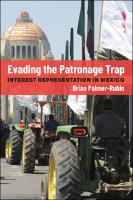Evading the Patronage Trap
External Review of Whole Manuscript
Interest Representation in Mexico
| dc.contributor.author | Palmer-Rubin, Brian | |
| dc.date.accessioned | 2022-08-08T09:31:10Z | |
| dc.date.available | 2022-08-08T09:31:10Z | |
| dc.date.issued | 2022 | |
| dc.identifier | OCN: 1308511431 | |
| dc.identifier.uri | https://library.oapen.org/handle/20.500.12657/57841 | |
| dc.description.abstract | Why have Latin American democracies proven unable to confront the structural inequalities that cripple their economies and stymie social mobility? Brian Palmer-Rubin contends that we may lay the blame on these countries’ systems of interest representation, which exhibit “biased pluralism,” a system in which the demands of organizations representing economic elites—especially large corporations—predominate. A more inclusive model of representation would not only require a more encompassing and empowered set of institutions to represent workers, but would also feature spaces for non-eliteproducers—such as farmers and small-business owners to have a say in sectoral economic policies. With analysis drawing on over 100 interviews, an original survey, and official government data, this book focuses on such organizations and develops an account of biased pluralism in developing countries typified by the centrality of patronage—discretionarily allocated state benefits. Rather than serving as conduits for demand-making about development models, political parties and interest organizations often broker state subsidies or social programs, augmenting the short-term income of beneficiaries, but doing little to improve their long-term economic prospects. When organizations become diverted into patronage politics, the economic demands of the masses go unheard in the policies that most affect their lives, and along the way, their economic interests go unrepresented. | en_US |
| dc.language | English | en_US |
| dc.subject.classification | thema EDItEUR::J Society and Social Sciences::JP Politics and government | en_US |
| dc.subject.classification | thema EDItEUR::J Society and Social Sciences::JP Politics and government::JPQ Central / national / federal government::JPQB Central / national / federal government policies | en_US |
| dc.subject.other | Patronage trap, Mexico, clientelism, interest organizations, interest representation, demand making, civil society, political parties, development policy, agriculture, business chambers, subsidies, linkages, distributive politics, Fondo PyME, Alianza para el Campo, PRI, PAN, PRD, Confederación Nacional Campesina, CNC, Central Campesina Cardenista, CCC, Asociación Nacional de Empresas Comercializadores, ANEC, Confederación Patronal de la República Mexicana, COPARMEX, Confederación de Cámaras Nacionales de Comercio, Servicios y Turismo, CONCANACO, Cámara Nacional de la Industria de la Transformación, CANACINTRA, Jalisco, Michoacán, Estado de México | en_US |
| dc.title | Evading the Patronage Trap | en_US |
| dc.title.alternative | Interest Representation in Mexico | en_US |
| dc.type | book | |
| oapen.identifier.doi | 10.3998/mpub.12132850 | en_US |
| oapen.relation.isPublishedBy | e07ce9b5-7a46-4096-8f0c-bc1920e3d889 | en_US |
| oapen.relation.isFundedBy | b818ba9d-2dd9-4fd7-a364-7f305aef7ee9 | en_US |
| oapen.relation.isbn | 9780472075447 | en_US |
| oapen.relation.isbn | 9780472055449 | en_US |
| oapen.collection | Knowledge Unlatched (KU) | en_US |
| oapen.pages | 328 | en_US |
| peerreview.anonymity | Double-anonymised | |
| peerreview.id | d98bf225-990a-4ac4-acf4-fd7bf0dfb00c | |
| peerreview.open.review | No | |
| peerreview.publish.responsibility | Scientific or Editorial Board | |
| peerreview.review.decision | Yes | |
| peerreview.review.stage | Pre-publication | |
| peerreview.review.type | Full text | |
| peerreview.reviewer.type | External peer reviewer | |
| peerreview.title | External Review of Whole Manuscript | |
| oapen.review.comments | The proposal was selected by the acquisitions editor who invited a full manuscript. The full manuscript was reviewed by two external readers using a double-blind process. Based on the acquisitions editor recommendation, the external reviews, and their own analysis, the Executive Committee (Editorial Board) of U-M Press approved the project for publication. |

